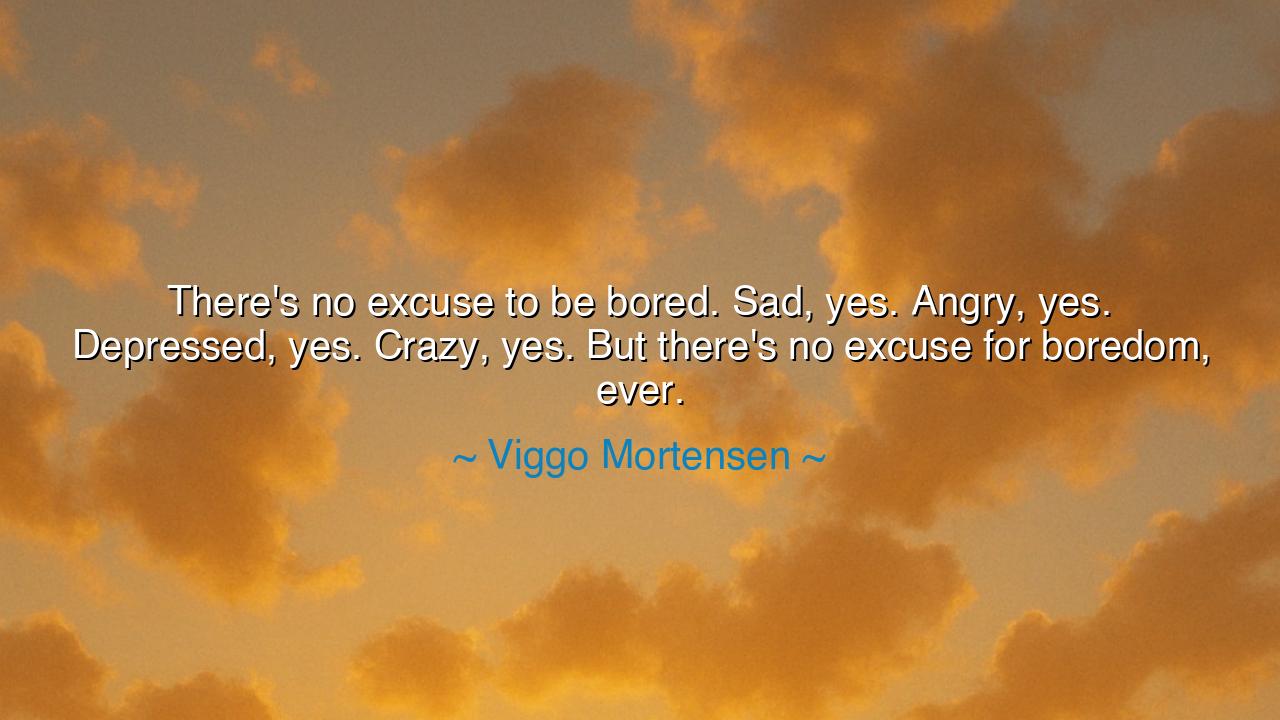
There's no excuse to be bored. Sad, yes. Angry, yes. Depressed
There's no excuse to be bored. Sad, yes. Angry, yes. Depressed, yes. Crazy, yes. But there's no excuse for boredom, ever.






The words of Viggo Mortensen, “There’s no excuse to be bored. Sad, yes. Angry, yes. Depressed, yes. Crazy, yes. But there’s no excuse for boredom, ever,” ring like a challenge from the ancient philosophers to the restless souls of our age. Beneath their simplicity lies a fierce and radiant wisdom — a call to awaken, to live with attention, and to reclaim wonder in a world that has forgotten how to see. For what Mortensen teaches is not the denial of emotion, but the rejection of apathy. Sadness, anger, and even madness are signs that one’s heart still beats and one’s spirit still wrestles with life. But boredom, he says, is the death of curiosity, the silence of the soul that has ceased to look, to question, to feel.
In every age, the ancients have feared one thing above all: the dulling of the human spirit. To be bored is not to lack entertainment — it is to lack presence. The philosopher Seneca once warned that “it is not that life is short, but that we waste much of it.” Mortensen’s words echo this ancient lament. The bored man has lost the art of wonder. Surrounded by beauty, he sees nothing. Offered infinite possibilities, he feels nothing. While others weep, love, create, and rage, he sits still, numbed by his own inattention. Thus, boredom is not an absence of stimulation — it is the refusal to engage with existence.
Mortensen, an artist in many forms — actor, poet, painter, and traveler — speaks from the heart of experience. His life has been one of immersion, not escape. He has walked through cultures, languages, and disciplines as a man devoted to living fully, even in pain. His statement reminds us that the only true sin against the soul is to cease being curious about the world. Sadness may break the heart, but it leaves one more human; boredom, however, makes the heart indifferent — and indifference is the first death before the body’s end. To be alive is to be interested, to wrestle with life’s mysteries even when they wound.
There is a story of Leonardo da Vinci, the restless genius of the Renaissance, who would follow strangers in the streets of Florence simply to study their faces, their movements, their moods. When asked why, he said that everything in life was a lesson to be drawn. Even decay fascinated him — he found beauty in the structure of bones, in the play of light upon broken stone. To such a man, boredom was unthinkable, for every breath, every shadow, every moment was a revelation of the divine. Mortensen’s wisdom flows from this same eternal river: that the world is never dull — only the eyes that cease to see it.
The great souls of history — artists, saints, warriors, and philosophers — have all faced despair, loneliness, and madness, but none surrendered to boredom. Even in captivity, Nelson Mandela read, studied, and reflected. Even in exile, Dante wrote poetry that reshaped the heavens. Even in blindness, Helen Keller called life “a daring adventure or nothing at all.” These figures understood, as Mortensen does, that the remedy to despair is engagement — not distraction, but participation in the rawness of being. To look at the stars, to study a leaf, to listen to a stranger’s story — all these are acts of rebellion against the gray stillness of boredom.
Mortensen’s inclusion of emotions such as sadness, anger, and depression is not an accident. He acknowledges that these states, while painful, are part of the sacred rhythm of existence. They remind us that we are alive, that the heart still feels the weight and pulse of the world. Boredom, on the other hand, is not an emotion — it is the absence of one. It is the hollow place where life’s fire has gone out, where nothing matters enough to stir the blood. In this sense, boredom is not harmless; it is the quiet corrosion of the soul. To allow oneself to be bored is to forget the privilege of consciousness itself.
The lesson, then, is both fierce and freeing: do not flee from life, even when it hurts. When sadness comes, feel it. When anger burns, understand it. When madness knocks, listen to what it teaches. But never, ever let the world become ordinary. Seek meaning in the smallest details — the sound of rain, the shape of a word, the movement of a crowd. Create, learn, explore, love, and fail — for these are the sacred antidotes to boredom. The wise of every age have known that the cure for emptiness is not ease, but attention. To live fully is the only way to defeat the emptiness of being.
So let Mortensen’s words be remembered not as a rebuke, but as a call to arms for the soul. There is no excuse for boredom because life, even in sorrow, is vast and holy. The universe itself is an unfinished poem, written moment by moment, and every heart has the chance to add a verse. Therefore, awaken each day not with expectation, but with wonder. Let curiosity be your prayer, and awareness your art. For as long as you can still marvel — even at your own sadness — you will never be bored, and you will never truly die.






AAdministratorAdministrator
Welcome, honored guests. Please leave a comment, we will respond soon